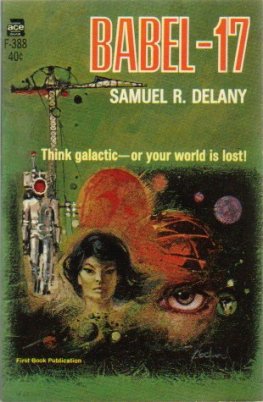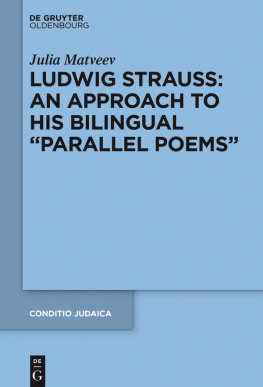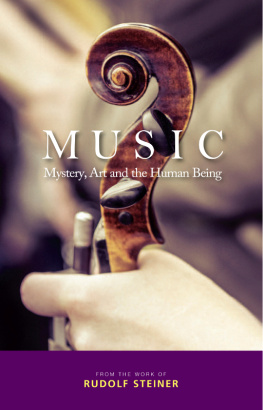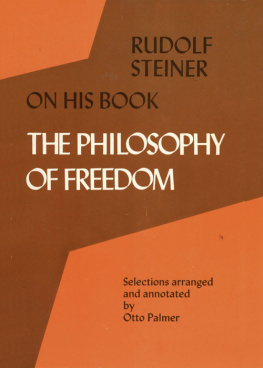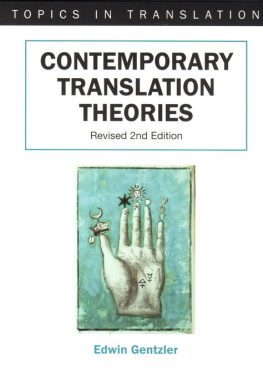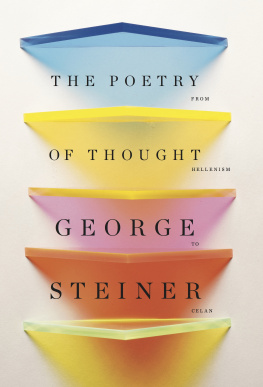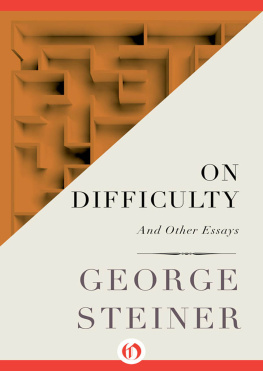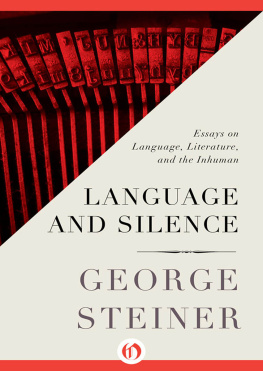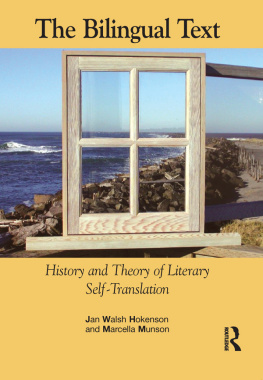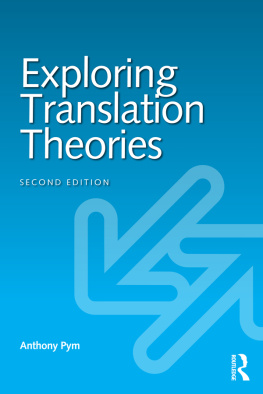After Babel
Aspects of Language and Translation
Third Edition
George Steiner

FOR ZARA
eyn ahereth
ACKNOWLEDGEMENTS
T HOUGH this book has, to a great extent, had to define and map its own field, it is none the less dependent on a large body of related work. Ones bibliography and footnotes are, in this respect, the most genuine act of thanks. The origin of the present study lies in the Penguin Book of Modern Verse Translation which I edited in 1966 (and which was later reissued under the title Poem Into Poem). Tony Richardson was a close collaborator in that project. His early, tragic death has left a constant void. There are deficiencies in the present book which he would have been the first to note. During the course of work, I have benefited from exchanges with translators and with the increasing number of poets and scholars concerned with translation. Let me mention only Robert Fitzgerald, Roger Shattuck, Donald Carne Ross, William Arrowsmith, Nathaniel Tarn, John Frederick Nims, Christopher Middleton, and Octavio Paz. Some of the theoretical and practical matter presented in this book first came up in the course of seminars at Harvard, Yale, and the University of Zrich. In each case, the debt which I owe to my students is considerable. It will also be obvious, at various points, how much I profited from the personal interest of Claude Lvi-Strauss and I. A. Richards. Thomas Sebeok, whose knowledge of the whole range of current language-studies may well be unrivalled, has been a good listener. Noam Chomsky has been generous in expressing his disagreements in private communication (an exchange of views is included in my earlier book, Extraterritorial: Papers on Literature and the Language Revolution). Mr. Robin Anderson, of Churchill College, read the first three chapters in draft and offered critical advice on technical issues. During early stages of research, I received invaluable support from the Guggenheim Memorial Foundation. Like so many other writers and scholars, I found in its Director, Prof. Gordon Ray, a vital ally. My indebtedness to my assistant, Mrs E Southern, would be difficult to put summarily.
In a direct sense, this volume owes its existence and scope to the initiative of Jon Stallworthy and his colleagues at the Oxford University Press. Theirs have been the indispensable patience and criticism. Mr Bernard Dod and Mr Nicolas Barker have proved the most exacting and helpful of copy-editors. Jon Stallworthy is himself both a poet and a translator. The advantage has been mine.
It is, under this rubric, customary to thank ones family and immediate circle of friends for their forbearance or enthusiasm during a long spell of often obsessive work. But there is cant in doing so, for what choice had they? The dedication of this book, on the other hand, says only a fraction of what it means.
G. S.
Cambridge, October 1973
PREFACE TO THE THIRD EDITION
B OTH the philosophy and practice of translation are in constant motion and debate. In the five years since the second edition of this book there have been marked developments.
The new status of eastern Europe has occasioned a veritable tide of translations both into English and into the relevant languages. Czech, Polish, Hungarian, and Romanian literature are beginning to reach the Anglo-American world-audience. In turn, Western texts, long forbidden, are being imported. Criteria of interlingual transfer, the history of translation, and the implication of the translators exact art in every aspect of comparative literary and cultural studies, are the object of study and teaching. By salutary paradox, moreover, Anglo-American masters, notably among the poets, are themselves turning more and more to translation. It is as if the planetary dominion of their privileged world-speech entails growing responsibilities towards the genius of more constricted national traditions and sensibilities. Whether by direct or interposed means, British and American writers are translating across a whole gamut of tongues, stretching from Russian and Japanese to Portuguese.
The darkening eclipse of the Greek and Latin languages and classics in our schools has heightened the need for translation, particularly of a non-academic order. The current charted by After Babel, already in 1975, has become a bright torrent: our finest poets, a Seamus Heaney, a Ted Hughes, a Derek Walcott are translating from or imitating metamorphically such texts as Homer, Ovid, Catullus, Seneca. Tony Harrison and Christopher Logue are virtuosos of often penetrative re-creation. A later classic such as Dante is drawing more and more translators from among the most vivid of our poetic voices. Still out of reach lies the exigent genius of Racine.
Research into diverse modes of machine- or machine-assisted translation continues. Some intriguing results have been achieved at the Berlitz levelthat is to say in the restricted vocabulary and syntax of the tourist or business-traveller. Mechanical glossaries and rudimentary textual transfers are proving of rough and ready assistance in the translation of certain technical and legal communications. But the notion, abroad in the 1950s and 1960s, of the machine-translation of natural language, let alone literature, is receding. The incommensurability of semantic context, set out in this book, most likely makes such expectations illusory.
There is also a reassuring modesty in more recent claims made for a theory of translation. After Babel tries to show that there cannot, in any strict or responsible sense, be any such theory. The cerebral proceedings which would have to underlie and explain it are simply inaccessible. At best, we have narratives of translational praxis. It is to these that the most useful journals in the field are now turning. Increasingly, actual practitioners are allowing a look into the workshop, into the successive drafts and revisions which generate the (incomplete) product. Therein lies the fascination of the interlingual and what substantive perceptions we can record of its fertile complexity. I would feel rewarded if After Babel has been an instigation.
Both in 1975 and 1992, I sought to conjecture as to the polyglot future in the face of the global detergence by an Anglo-American esperanto, itself splitting into more local though cognate forms. Chinese remains a formidable but inwardly focused rival. Culturally and demographically, Spanish is on the march. Smaller and isolated languages, notably in sub-Saharan Africa and throughout Amazonia, are perishing, as is the ecology inwoven in their unique image of life. Thus one is tempted to suppose that the triumphalism of science, of technocracy, of international finance and the mass-market media will assure the long-term hegemony of Anglo-American (computer languages reflect and enforce this prepotence). Reality, however, is always subtler and more ironic than our suppositions. It may well be that the Tower of Babel will continue to cast its creative shadow.
G.S.
Cambridge, August 1997
PREFACE TO THE SECOND EDITION
T HIS book was written under somewhat difficult circumstances. I was at the time increasingly marginalized and indeed isolated within the academic community. This is not, necessarily, a handicap. Tenure in the academy today, the approval of ones professional peers, the assistance and laurels in their giving, are not infrequently symptoms of opportunism and mediocre conventionality. A degree of exclusion, of compelled apartness, may be one of the conditions of valid work. Scientific research and advance are in substantial measure and logic collaborative. In the humanities, in the disciplines of intuitive discourse, committees, colloquia, the conference circuit are the bane. Nothing is more ludicrous than the roll-call of academic colleagues and sponsors set out in grateful footnotes at the bottom of trivia. In poetics, in philosophy, in hermeneutics, work worth doing will more often than not be produced against the grain and in marginality.
Next page


